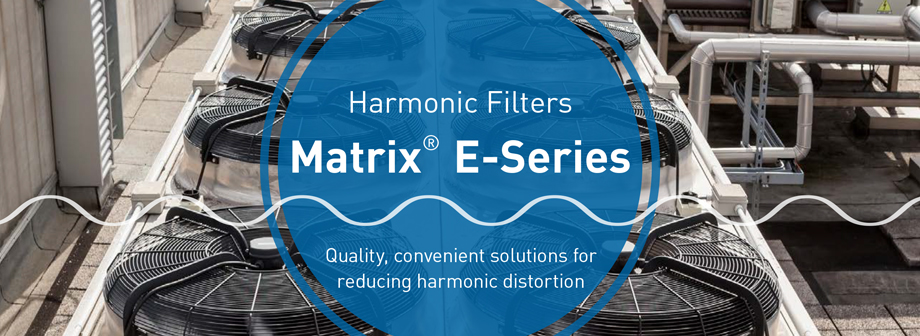Matrix AP and E-Series Harmonic Filters
AP Harmonic Filters
Product Overview
Simply put, our Matrix® AP is the most advanced passive filter on the market today. Most traditional filters work fine at 100% power load, but severely underperform at lower loads. Matrix AP is different, because we know almost no one runs at full load all the time. Its patented Adaptive Passive Technology virtually eliminates harmonic distortion by adapting to varying power loads. It delivers better THID performance, increases energy efficiency, and allows you to meet IEEE-519 requirements. Its unique design generates less heat, and is easy to install and maintain. Plus it is generator compatible. With Matrix AP Harmonic Filters, power quality, energy efficiency and reduced downtime are easy to achieve.
Harmonics Are a Problem
Harmonic distortion has become an increasing concern for facility managers, users of automation equipment and specifying engineers alike. Harmonics not only waste energy, but they reduce equipment life, electrical system reliability, system efficiency and equipment productivity.
Guaranteed Results
Unlike other harmonic filter technologies, the performance of MTE Matrix Harmonic Filters is guaranteed! On AC variable frequency, variable torque drive applications (fans & pumps), Matrix filters will meet the guaranteed maximum levels of THID (total harmonic current distortion) all the way from no load to full load. Additionally, Matrix filters will not cause power system resonance nor attract harmonics from other non-linear loads. No system analysis is required to select and apply Matrix Filters.
Typical Applications Include:
- Mission critical facilities
- AC variable frequency drives
- DV adjustable speed drives
- Electronic welders
- Battery chargers
- Fans and pumps
- Water Treatment facilities
- Induction heating equipment
- Elevator drives
- 3-phase power supplies
- Any 6-pulse rectifier
Convert 6-Pulse Drives to Multi-Pulse Harmonic Performance
Matrix filters allow users to achieve attenuation of harmonics to levels below that previously attainable only by using 12-pulse or 18-pulse rectification methods. Use standard 6-pulse drives and our MD & M5 series matrix Filters in place of 18-pulse rectifiers and use our M8 Series in lieu of 12-pulse rectifiers.
Matrix filters meet International power quality standards such as: IEEE-519, G5/4, AS2279, EN61000
UL Listed (UL-508) – Harmonic filters are UL listed (File E180243) for both the US and Canada.
E-Series Harmonic Filters

Performance you can count on – at an affordable cost.
The patented Matrix® E-series is the latest in a long line of highly effective harmonic filters from MTE. The E-series delivers the performance you’ve come to expect out of a Matrix filter without being over engineered. It is
an affordable solution to managing unwanted harmonic distortions – such as nuisance tripping of circuit breakers, inaccurate measurements on sensors, overheating of components, and system downtime – generated by Variable Frequency Drives (VFDs).
The Matrix E-Series features a flexible design that is compact and robust, making it easy to integrate and install in nearly any application. Power quality, energy efficiency, and reduced downtime are easy to achieve with the new Matrix E-Series from MTE.
Patented design with reliable components provides harmonic mitigation and
reduced THID (Total Harmonic Distortion) where you need it most.
Affordable solution that is easy to install and maintain.
Helps extend service life of electrical equipment and transformers.
Alleviates system downtime by preventing blown fuses and tripped circuit breakers.
- Meets essential harmonic distortion requirements
- Flexible, compact design
- Easy to integrate and install
- Extends the service life of electrical equipment
The Matrix® E-Series harmonic filter meets the international harmonic distortion requirement of 10%-15% while also supporting the compliance of IEEE-519.
